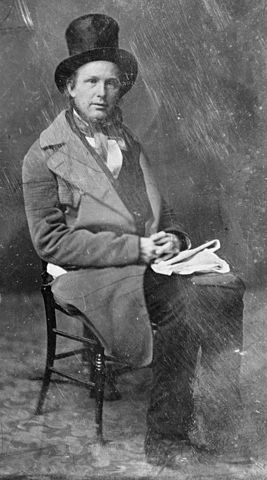Greeley, Horace (1811-1872)
BIOGRAPHICAL NOTE
 Horace Greeley was a highly influential newspaper editor and publisher, who was born on 3 February 1811 in Amherst, New Hampshire and died 29 November 1872 in Pleasantville, New York. Robert C. Williams' biography, Horace Greeley: Champion of American Freedom (2006) describes Greeley as a Grahamite: "Soon after his move to New York City, Greeley met Mary Young Cheney. Both were living at a boarding house run on the diet principles of Sylvester Graham, eschewing meat, alcohol, coffee, tea, and spices, as well as abstaining from the use of tobacco. Greeley was subscribing to Graham's principles at the time, and to the end of his life rarely ate meat." Among the social justice issues with which Greeley engaged are veg*nism, women’s rights and Abolition.
Horace Greeley was a highly influential newspaper editor and publisher, who was born on 3 February 1811 in Amherst, New Hampshire and died 29 November 1872 in Pleasantville, New York. Robert C. Williams' biography, Horace Greeley: Champion of American Freedom (2006) describes Greeley as a Grahamite: "Soon after his move to New York City, Greeley met Mary Young Cheney. Both were living at a boarding house run on the diet principles of Sylvester Graham, eschewing meat, alcohol, coffee, tea, and spices, as well as abstaining from the use of tobacco. Greeley was subscribing to Graham's principles at the time, and to the end of his life rarely ate meat." Among the social justice issues with which Greeley engaged are veg*nism, women’s rights and Abolition.
Greeley tends to organize other-than-human animals into a moral hierarchy in which affection and compassion are reserved for beings like horses and birds as opposed to pests. Moral consideration is often expressed through possessives – “our” – and limited to domesticated animals, especially those used for transportation. Several texts express a pacifist stance against war and predation alike. However, predation is often a marker of animality in Greeley’s rhetorical practices. His promotion of veg*nism is motivated more by health than ethical reasons, supporting his Temperance convictions and condemnation of excessive eating, alcohol consumption, and idleness. In his addresses to farming associations he promotes a plant-based diet and compares the status of enslaved African Americans to farm animals in order to offer an ethics of human-animal reciprocity. Greeley deplores “needless” violence at large, and at times this critique extends to compassion for other-than-human animals. Elsewhere, his combination of Temperance ideals with pacifism results in an implicit ethical veganism: “This friend found himself at twenty athirst for knowledge, yet without the usual means of assuaging that thirst. ... by the side of a pretty lake, deep in the shrouding forest, far away from homes and the haunts of men, he with his own hands built his small but adequate cabin – sufficient to contain his few but choice books, his simple food, his clothing and himself. By its side he planted the patch of corn and other esculents which formed his principal food; for no deadly weapon defiled his peaceful sanctuary, and the gentler denizens of the flood and the forest pursued their sports unharmed and fearless within the shadow of his lodge” (“The Bases of Character” 70-71).
PUBLICATIONS
“The Bases of Character.” The Rose of Sharon: A Religious Souvenir. Ed. Sarah C. Edgarton, C. M. Sawyer, et al. Boston: A. Tompkins and B. B. Mussey, 1857. 65-73.
Mr. Greeley's Letters from Texas and the Lower Mississippi: To which is Added His Address to the Farmers of Texas, and the Speech on his Return to New York, June 12, 1871. New York: Tribune Office, 1871.
What the Sister Arts Teach as to Farming. An Address before the Indiana State Agricultural Society at its Annual Fair, Lafayette, Indiana, October 13th, 1853. New York: Fowlers and Wells, 1853.
